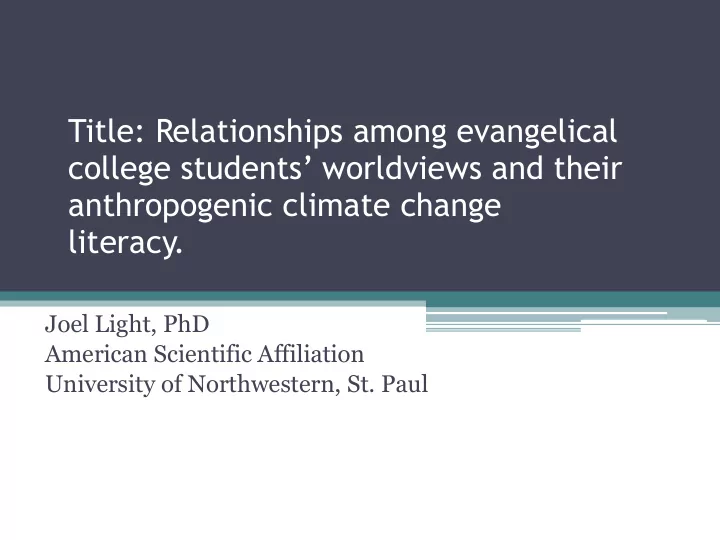

Title: Relationships among evangelical college students’ worldviews and their anthropogenic climate change literacy. Joel Light, PhD American Scientific Affiliation University of Northwestern, St. Paul
Justification • Evangelicals are largely resistant to acceptance of anthropogenic climate change. • Knowing why could influence curriculum and instruction. • Meaningful policy and action in the U.S. will not happen without this subgroup.
• In what ways does an evangelical college student’s Primary Research Question worldview, specifically the religious, environmental, economic, political, and epistemological areas of belief, relate to his or her anthropogenic climate change literacy, that is his or her knowledge, beliefs, and acceptance of anthropogenic climate change?
Three Propositions from Literature • Number 1: Evangelical students’ worldviews are made up of areas of belief. • Number 2: There is a range of knowledge, beliefs, and acceptance of anthropogenic climate change among evangelical college students. • Number 3: An evangelical college student’s worldview relates to his or her knowledge, beliefs, and acceptance of anthropogenic climate change.
Evangelical Continuum of Acceptance • Based on literature: a continuum of acceptance of anthropogenic climate change in this group. • Dismissive/Doubtful • Skeptical/Cautious • Concerned/Active
Research Paradigm • Case study approach employed. • Qualitative research paradigm. • Individual college students representing the three variations of acceptance. • 8 instruments of data collection
Analysis and Reporting • Data coded • Themes emerged • Narratives constructed • Cross-case comparison
Cross-Case Analysis: to accept or to not accept Evangelicals that accept: Evangelicals that resist: • Positive view toward science. • Skeptical view toward science. • More integrated understanding of CC. • More segmented knowledge and missing information. • Accepted that humans can affect planet systems. • Accepted that humans could only affect smaller, more localized systems. • Had a more harmonious view of the relationship between God, humans, and the • Had a more hierarchical view of the environment. relationship between God, humans, and the environment. • See CC as a threat to religious values – creation care and social justice. • See CC as unimportant due to higher held values – evangelism and God’s sovereignty. • High empathy for suffering people and for nature. • Lower empathy for others. • Held more of a global perspective. • Held more of a self-focused perspective. • Key people from culture influenced views. • Missing climate positive voices in experiences.
The Short Answer to the Research Question: • Worldview matters. • Religious beliefs are at the core. • Values have to be a part of the conversation. • Scientific data second.
Curriculum and Instruction Instruction Curriculum Recommendations: Recommendations: • What to teach… • How to teach… • Regional vs. global change • Real-world examples • Time scales and rates of change • Religious language/principles • Short and long term patterns • Similar voices (Climate Prophets) • Data and evidence • Impacts of climate change (specific and current) • Human influence
Final Summary • Landing on hope • Encouraged • What is possible
Questions?
Recommend
More recommend